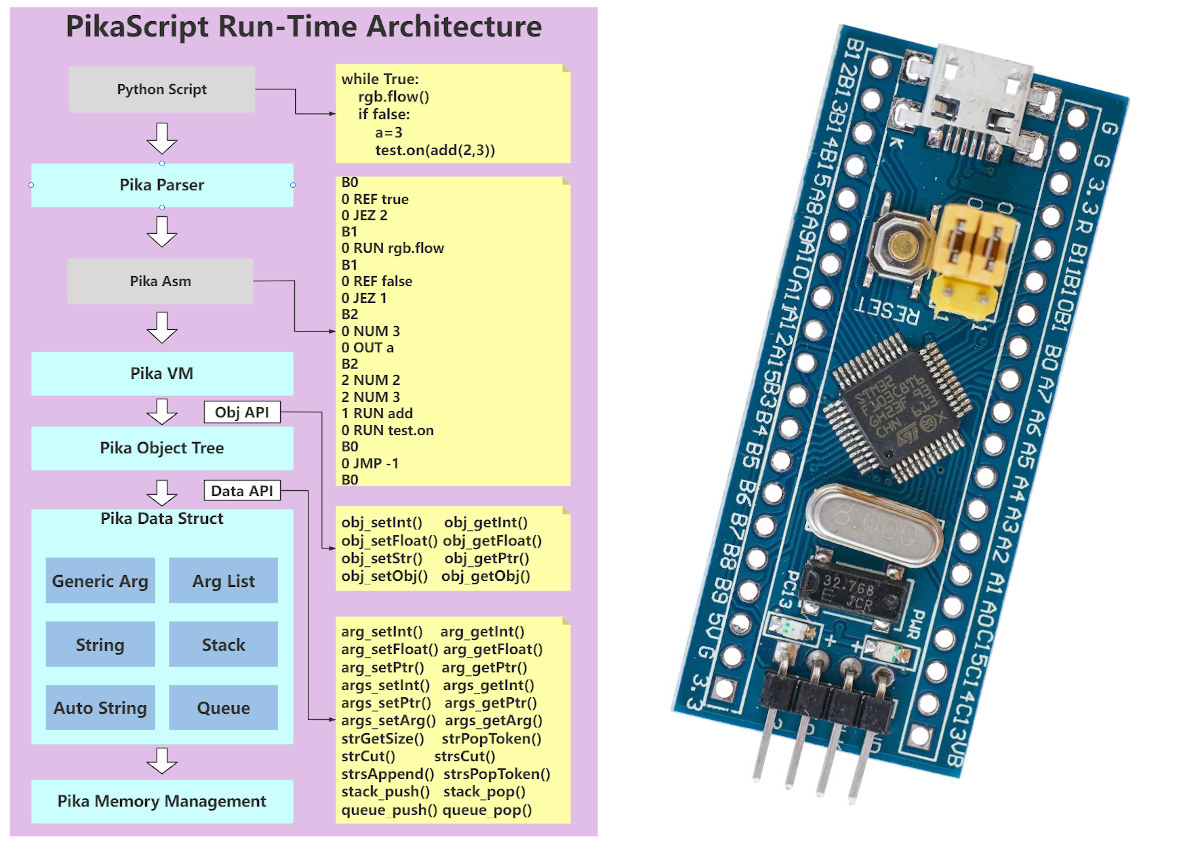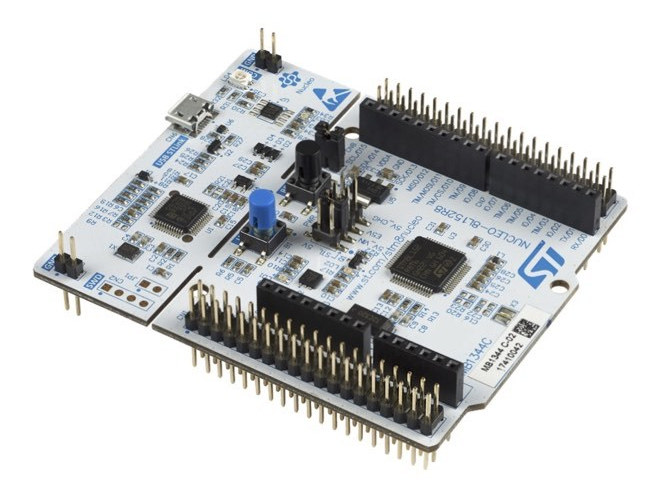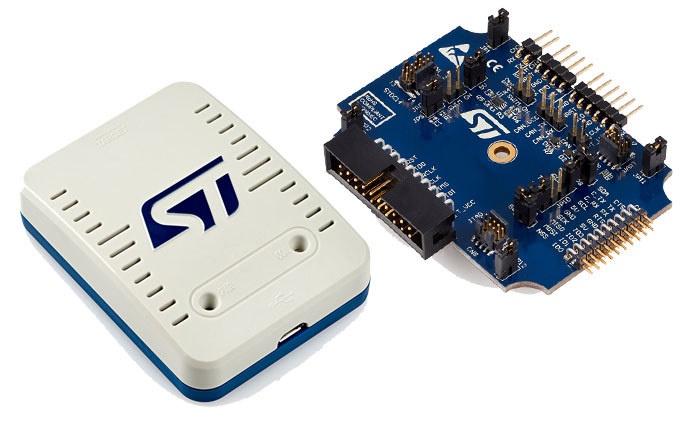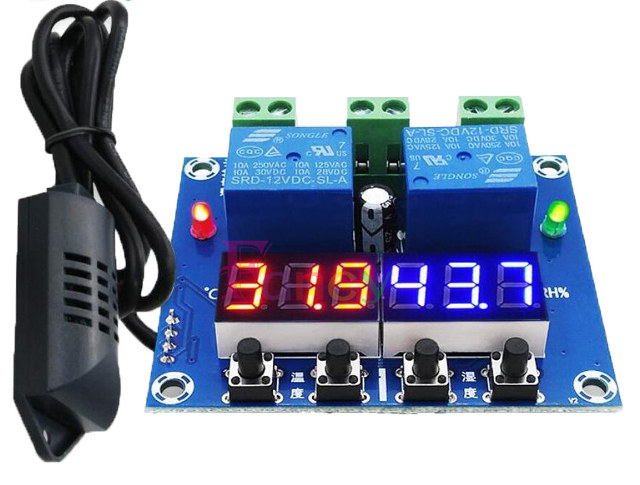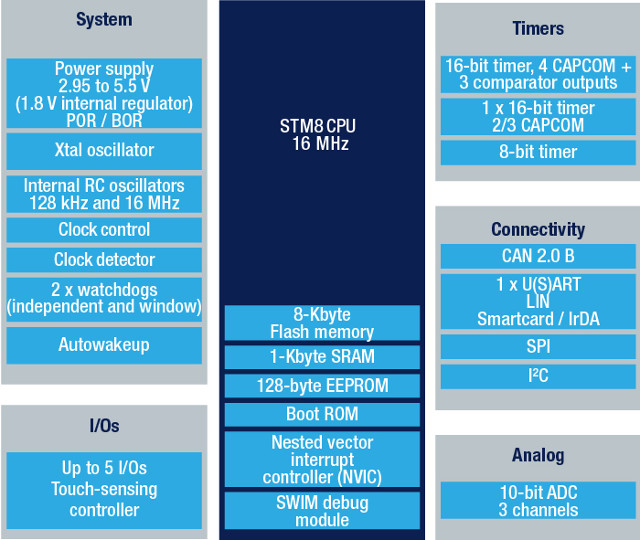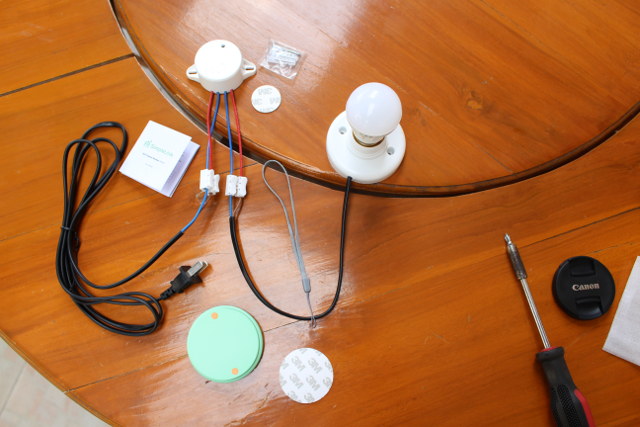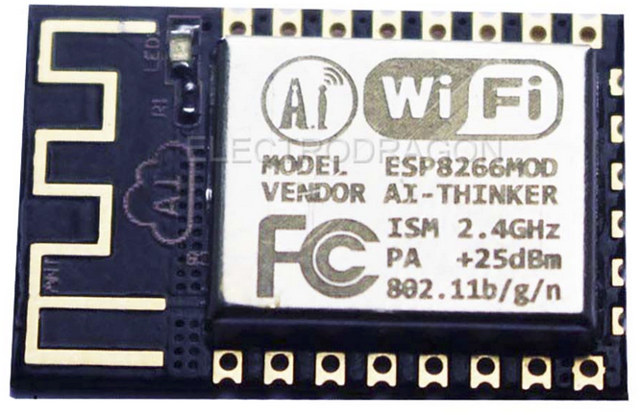PikaScript is an ultra-lightweight Python engine that can run on microcontrollers with as little as 4KB of RAM and 32KB of Flash, while the more popular MicroPython requires at least 256kB of code space and 16kB of RAM. PikaScript was initially developed to run on STM32G030C8 and STM32F103C8 MCUs, meaning, for example, it works on the BluePill board, but it has also been ported to other platforms like WCH CH582 RISC-V MCU, WinnerMicro W806 C-Sky microcontroller, as well as other like Raspberry Pi RP2040, ESP32-C3, etc… but those are not quite as well supported with some features missing. PikaScript also permits the binding C function to a Python module through Pika Pre-compiler. PikaScript can run bare metal on the microcontroller, but also supports real-time operating systems such as RT-Thread and VSF (Versaloon Software Framework), as well as Linux. Just like MicroPython, it’s using a subset of Python 3, but I’d […]
STMicro Introduces the First STM8 Nucleo Boards, STM8 Arduino IDE Support
While development boards based on STMicro STM8 8-bit MCU such as the “one dollar board” or the official STM8 Discovery boards have been around for several years, STMicro had yet to release a Nucleo board based on the microcontroller. The company has now unveiled not one, but two such boards with NUCLEO-8L152R8 and NUCLEO-8S208RB. Both boards will look similar as only the MCU differs. The former features a 16 MHZ MCU with 64 kB flash and 4KB SRAM, while the latter comes with a 24 MHz MCU with 128 kB flash, and 6KB SRAM.STM8 Nucleo board specifications: MCU (One of the other) NUCLEO-8L152R8 – STMicro STM8L152R8T6 8-bit MCU @ 16 MHz with 64 kB flash, 2KB EEPROM, 4KB SRAM NUCLEO-8S208RB – STMicro STM8S208RBT6 8-bit MCU @ 24 MHz with 128 kB flash, 2KB EEPROM, 6KB SRAM 4x LEDs – USB communication (LD4), 5V STLINK (LD3), User (LD2), Power (LD1) 2 […]
STLink-V3 Modular Debugger & Programmer for STM32/STM8 Adds I2C, SPI, CAN Interfaces
STLink is the in-circuit debugger and programmer for STMicro STM32 and STM8 micro-control working with SWIM and JTAG/SWD interfaces. ST Microelectronics has now introduced STLink-V3 which also provides a Virtual COM port interface allowing the host PC to communicate with the target microcontroller through one UART, as well as bridge interfaces (SPI, I2C, CAN, GPIOs) which can be used for programming of the target through the bootloader for example. Key features of STLink V3 debugger: Stand-alone probe with modular extensions Self-powered through a USB connector (Micro-B) USB 2.0 high-speed compatible interface Direct firmware update support (DFU) JTAG / serial wire debugging (SWD) specific features:3 V to 3.6 V application voltage support and 5 V tolerant inputs Flat cables STDC14 to MIPI10 / STDC14 / MIPI20 (connectors with 1.27 mm pitch) JTAG communication support SWD and serial wire viewer (SWV) communication support SWIM specific features (only available with adapter board MB1440):1.65 […]
XH-M452 Board Helps Controlling a Cabinet or Room’s Temperature & Humidity
XH-M452 is a board designed to control the temperature and humidity in a room or cabinet. It comes with two relays to control appliances like fans, air conditioners, (de-)humidifiers, or heaters, and ships with a temperature and humidity probe attached to a one meter cable. XH-M452 board specifications: “ST Controller” Relays – 2x SONGLE 10A/250VAC 125VAC relays for temperature control (left) and humidity control (right). Display – 2x LED display for temperature & humidity Sensor 1 meter probe for temperature & humidity Temperature range – -20 to 60°C +/- 0.1°C Humidity range – 0% to 100% RH +/- 0.1% RH Misc – +/- buttons to adjust temperature and humidity; 2x relay status LEDs. Power Supply – 12V via terminal Dimensions – 65 x 55 x 28mm You’ll need to provide a 12V power source for the board, connect an appliance to control the temperature on the left terminals, and an […]
FOSDEM 2018 Open Source Developers Meeting Schedule
FOSDEM (Free and Open Source Software Developers’ European Meeting) occurs every year on the first week-end of February, where developers meet for two days discussing about open source software projects. FOSDEM 2018 will take place on February 3-4 this year with 652 speakers, 684 events, and 57 tracks, an increase over last year 608 speakers, 653 events, and 54 tracks. There will be 8 main tracks namely: Community, History, Miscellaneous, Performance, Python, Security and Encryption, Space, and Global Diversity CFP Day. There will also be 33 developer rooms, and since the full schedule is now available, I’ll make a virtual schedule mostly based on sessions from the Embedded, mobile, and automotive, Hardware Enablement, and Internet of Things devrooms. Saturday 3, 2018 09:50 – 10:15 – Turning On the Lights with Home Assistant and MQTT by Leon Anavi In this presentation you will learn the exact steps for using MQTT JSON […]
STMicro Introduces 20 Cents STM8S001J3 8-Bit MCU in 8-Pin Package
STMicro has launched a new 8-bit micro-controller that sells for $0.20 per unit in 10k quantities, a price not too far from the one of cheapest MCU, especially considering it comes with flash. STM8S001J3 is also the first STM8 MCU offered in 8-pin package (SO8N), and should compete with some of the Microchip Attiny or PIC12F series micro-controllers. STM8S001J3 specifications: Core – 16 MHz advanced STM8 core with Harvard architecture and 3-stage pipeline,extended instruction set System Memory – 1 Kbyte RAM Storage 8 Kbytes Flash memory; data retention 20 years at 55 °C after 100 cycles 128-byte true data EEPROM; endurance up to 100 k write/erase cycles Clock, reset and supply management 2.95 V to 5.5 V operating voltage Flexible clock control, 3 master clock sources: external clock input; internal, user-trimmable 16 MHz RC; internal low-power 128 kHz RC Clock security system with clock monitor Power management – Low-power modes […]
Review and Teardown of Simplelink Self-Powered Power Switch
After I wrote about SimpleLink Batteryless power switch and receiver, the company decided to sent me a kit to try out by myself. So in this review, I’ll checkout the kit, install a demo to show how it works, and finally have a look at the internals. The kit include a power cord with a US plug and a holder and corresponding light bulb that you need to connect to the corresponding red and blue wire of the receiver (white cylinder), and you can control with the green power battery-less switch. Two 3M double face stickers are also included for the receiver and switch, as well as a strap for the switch, a screw set for either the light holder or receiver, and a user’s manual shown below. Installation is pretty self-explanatory, and you just need to connect the blue and red cables to the input (mains) and output (light) […]
ESP-14 WiFi Module Combines ESP8266 with STM8S MCU
ESP8266 WiFi modules can be purchased for less than $3, while some STM8S 8-bit MCUs board sell for just above $1. A.I. Thinker decided to combine both by adding an STMicro STM8S003 micro-controller to ESP-12E module and called that ESP-14. ESP-14 specifications: WiSoC – Expressif ESP8266-EX WiSoC MCU – STMicro STM8S003F3P6 8-bit MCU @ 16 MHz with 1KB RAM, 8KB flash, and 128 bytes EEPROM Connectivity – 802.11 b/g/n WiFi I/Os – STM8: 15 GPIOs also supporting I2C, SPI, UART, and up to 5 10-bit ADC ESP8266: E_GPIO0 to select operating mode (running or download) Power Supply – 3.3V Power Consumption – System Standby mode 70 mA; 0.5 μA shutdown @3.3V Dimensions – 24 x 16 mm STM8S controls ESP8266 by AT commands, and all but one of the I/Os are directly connected to STM8S. I can see at least two advantages: 5 ADC inputs are available, and for battery […]


